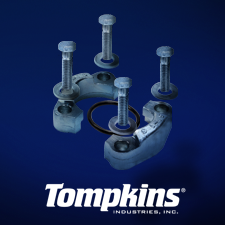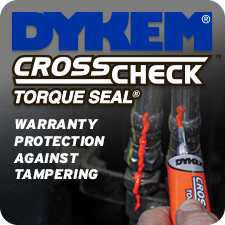A different kind of distributor
From bearings and PT products, to machining and fabrication, ISC Companies offers true turnkey solutions
by Rich Vurva
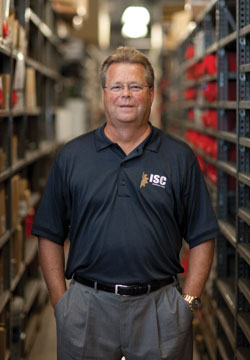 Take a walk through most distribution companies and you often feel a strong sense of déjà vu. This been-there-seen-that feeling occurs because most distribution facilities are very much alike. While they focus on unique marketplaces, they tend to sell the same products and offer the same types of services as other distributors.
Take a walk through most distribution companies and you often feel a strong sense of déjà vu. This been-there-seen-that feeling occurs because most distribution facilities are very much alike. While they focus on unique marketplaces, they tend to sell the same products and offer the same types of services as other distributors.
Walking through the ISC Companies headquarters in Minneapolis conjures up a different sensation. There's the physical separation between the sales/administrative offices and the warehouse common to most distribution organizations. But what makes this company atypical is what takes place behind the warehouse.
As you enter the annex attached to the warehouse, the air fills with the sights, sounds and smells of a metal grinding operation. Equipped with CNC machines and other fabrication and assembly devices, this section of the nearly 40,000 square foot building resembles a manufacturing facility more than a conventional distribution warehouse.
It's here that ISC takes standard components and modifies them to fit a customer's specific requirements, or creates 3D CAD-generated designs to build a simple part or a complex finished assembly.
How it got here
Now in its third generation, the company was founded in 1939 as Auto and Industrial Supply, providing MRO bearings and power transmission supplies to local industry. The name was later changed to Industrial Supply Company. It rode the same economic roller coaster as other distributors over the next several decades. When marketplace changes began to shift customer preferences toward the big chains and national contracts, Industrial Supply Company recognized the need to look different from the competition.
"We couldn't be a me-too company offering the same products that everyone else offered," says president and owner Mark Koch. "So we started to ask ourselves what we could do to create a unique value proposition for this organization so we weren't out there just talking about features and benefits like everybody else."
The first move in a new direction was to join forces with other independent distributors in forming IDC-USA, the distributor-owned cooperative of bearings and power transmission distributors. Membership in IDC provides greater buying power, additional warehouse and stocking locations, and access to private label products. It also offers networking opportunities to share ideas.
Another key move was adding a one-person machine shop in the late 1990s, enabling the company to modify standard components. About five years later, the acquisition of Cambridge Metalworks, a Minneapolis-based machine shop, greatly enhanced machining and fabrication capabilities. That fortuitous decision set the stage for Industrial Supply to provide services that traditional distributors couldn't offer.
The Cambridge acquisition also introduced an entirely new customer base. When ISC designers recently created the framework for a portable staging system for a Dallas performing arts center, it opened up an opportunity to sell mechanical and power transmission components such as motors, sheaves and lifters. "We've gotten into new customers that we had never heard of before," says Koch.
The company expanded into a new geography with the 1999 acquisition of Reel Industrial in Rapid City, S.D., and into new product lines when it acquired Industrial Sensors and Controls in 2007. Its most recent acquisition, Adams Machining in Rapid City, is a precision machining, welding, repair and manufacturing facility.
A re-branding effort three years ago changed the name to ISC Companies to more accurately reflect that the organization is more than just a supplier of bearings and power transmission products.
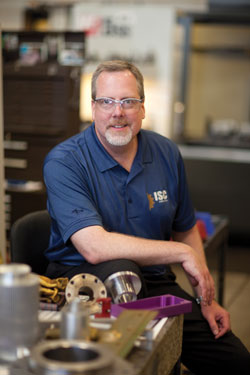 Today, the company is organized into three separate groups. "We are very careful to call them groups, not divisions, because we want to promote the synergies that we have between the three entities," says director of marketing Christopher Bursack.
Today, the company is organized into three separate groups. "We are very careful to call them groups, not divisions, because we want to promote the synergies that we have between the three entities," says director of marketing Christopher Bursack.
The largest of the three groups is the Bearings and Power Transmission Group, which is the traditional distribution arm of the company, representing hundreds of manufacturers of power transmission and bearings products and services. The Machining and Fabrication Group builds modified parts and made-to-order assemblies and offers a range of machine component design, fabrication and quality assurance capabilities. The Sensors and Control Group provides a full line of sensors, bar code and RFID devices, and switches for process control and monitoring functions.
Combining the strength of a full-line bearing and power transmission distributor with in-house design, machining and fabrication capabilities, plus sensors and controls expertise, enables ISC to offer turnkey solutions from a single source.
"It pulls us deeper into our customers than we ever were before. We'll find our sales guys on engineering design teams designing customers' new equipment at the OEM level," says sales manager Bob Ziegeweid.
About 70 percent of the company's sales are now dedicated to OEM customers. "Where we tend to shine is with customers in the packaging and process industries that look to us for mechanical or electrical component solutions," Ziegeweid says. For example, instead of simply providing a motor to an OEM customer for installation in a conveyor assembly, ISC will more than likely design and fabricate the entire assembly, which could include a motor, a gear box, a coupling guard and other components, and install it onto a base on a custom-built pallet for delivery to the manufacturer for final installation on the finished product.
"It's a totally custom solution. It's taking the standard components that we distribute and combining them with our machining capability and fabricating a complete assembly for them," says Bursack.
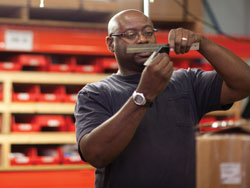 Many customers purchase from two or more groups. When that happens, the company profits from its typical product margins, but also charges the customer for design, machining and fabrication, further boosting profitability.
Many customers purchase from two or more groups. When that happens, the company profits from its typical product margins, but also charges the customer for design, machining and fabrication, further boosting profitability.
Koch says bearings and power transmission distribution remains the company's core business. "We're using complementary businesses like machining and sensors to enhance our core offering. It's allowing us to penetrate deeper with existing customers but, on the other hand, it's getting us into new arenas we've never been in before."
Where it's going
With annual sales of more than $20 million and long-time banking relationships, Koch says the company has capital to make future acquisitions. Using the Cambridge acquisition as a blueprint, he hopes to replicate that success in Rapid City, where ISC is merging the distribution operation with the machining and fabrication expertise of Adams-ISC.
Chief financial officer William Nelson – a certified public accountant with a decade of experience in the asset-based lending arena – provides valuable knowledge and expertise in valuing prospective acquisitions, structuring deals and negotiating a price. "When you go in to buy a company, you're trying not to pay too much. You're trying to buy what's there and identify the opportunity that might be available going forward," he says.
As an asset-based lender, Nelson looked for distressed companies
that buyers could obtain for a low price. "I don't think that way anymore," he says. "If you buy a company with a low asset value, it takes a tremendous amount of work to improve its value.
Ideally, an acquisition benefits both buyer and seller. Depending upon how a deal is structured, the seller may choose to remain with the merged companies following the acquisition and may benefit financially from future growth. "With all of our acquisitions, some of the existing ownership remained. To do that, you've got to create a win-win," Koch says.
Depending upon the circumstances, Koch is open to acquiring additional machine shops in nearby geographic regions and bringing in distribution capabilities, or acquiring other independent distributors.
"The message I'm interested in sending to other distributors is that there is an alternative to selling out to a big guy," he says. "You can remain independent. There are a lot of opportunities if you're interested in acquiring or being acquired and staying independent. That's what we've done. It's made us unique and it's kept us independent."
This article originally appeared in the Sept./Oct. 2011 issue of Industrial Supply magazine. Copyright 2011, Direct Business Media.












